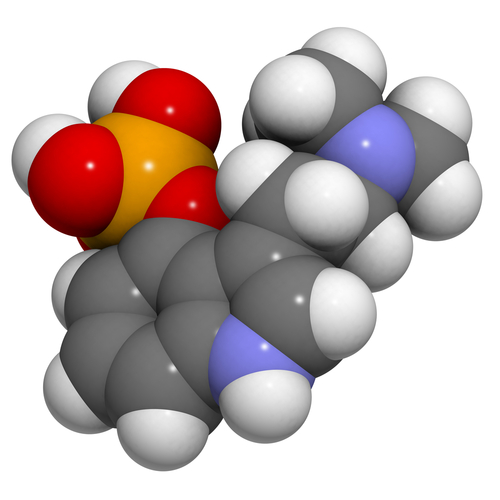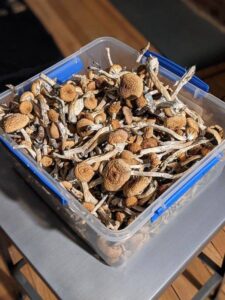By Ross Pomeroy
Researchers have discovered that low doses of psilocybin, the psychedelic compound in magic mushrooms, speed the extinction of the conditioned fear response in mice. The results could pave the way for psilocybin to be explored as a potential treatment for post-traumatic stress disorder and other related conditions in humans.
Reporting in the journal Experimental Brain Research, a team led by Dr. Briony Catlow of the Lieber Institute for Brain Development sought to determine how psilocybin affected the learning and removal of a conditioned fear response.
Mice were injected with varying doses (0.1, 0.5, 1.0 and 1.5 mg/kg) of psilocybin, 1.0 mg/kg of ketanserin (a drug that acts oppositely on the receptor which binds psilocybin), or a saline control. Twenty-four hours later, the animals were placed in a testing chamber and conditioned to fear a 15-second audio cue. The mice heard the cue, and after 30 seconds, received very brief electric shocks delivered through the chamber floor. Each mouse underwent ten trials, each separated by 210 seconds. After ten trials, all of the animal subjects froze in fear after the start of the 15-second audio.
The next day, the mice were placed in the chamber again and underwent the same process. Except this time, the shock was left out. The goal here was to effectively retrain the mice to not fear the audio cue and disassociate it with the shock. The researchers found that after only three trials, mice treated with low doses of psilocybin (0.1 and 0.5 mg/kg) no longer froze after hearing the audio cue. But mice injected with higher doses of psilocybin or ketanserin didn’t stop freezing until the tenth trial. Mice that were injected with a saline control still froze in fear after ten trials.

The study did not discern a precise reason for psilocybin’s fear-extinguishing effect, but Catlow thinks it might have something to do with the drug’s known ability to modify and control neural circuitry.
“Memory, learning, and the ability to relearn that a once threatening stimuli is no longer a danger absolutely depends on the ability of the brain to alter its connections,” Catlow told Real Clear Science. “We believe that neuroplasticity plays a critical role in psilocybin accelerating fear extinction.”
With research into medicinal applications of psychedelics picking up of late, this study may translate well into human trials. In previous studies, low doses of psilocybin were found to produce little to no differences in general well-being, emotional excitability, anxiety, depression, heart rate, or blood pressure, so the risk of adverse side effects seems minimal. Moreover, similar to the mice in the current experiment that associated a harmless noise with a painful shock, those suffering from anxiety disorders such as PTSD are basically conditioned to link neutral stimuli with something that’s dangerous and perturbing. Perhaps psilocybin could help erase those links?
“It is highly possible that in the future we will continue these studies since many interesting questions have come up from these experiments. The hope is that we can extend the findings to humans in clinical trials,” Catlow told RCScience.
Source: Briony J. Catlow, Shijie Song, Daniel A. Paredes, Cheryl L. Kirstein, Juan Sanchez‐Ramos. Effects of psilocybin on hippocampal neurogenesis and extinction of trace fear conditioning. Exp Brain Res 2 June 2013 DOI 10.1007/s00221-013-3579-0



